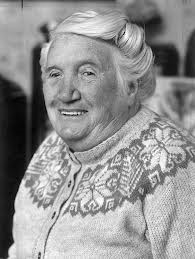Scritta intorno al 1920 “O dear me” (conosciuta anche come “The Jute Mill Song” ) è la canzone più popolare di Mary Brooksbank. Mary Brooksbank in Chapbook Vol 3 no.4 dice: “That was a’ there was of it, just one verse. I first heard it in 1912 … they used tae sing it in the street and up and down the Passes between the frames in the mills.
Non si tratta di lavoro nei Mulini ma nei Filatoi industriali spuntati come funghi a Dundee, rinomata Jutopolis della Scozia (vedi)
Intervistata da Hamish Henderson in merito alla canzone Mary disse “Only the ditty, ‘Oh dear me, the mill’s gaen fest, the puir wee shifters…’ The verses are all mine. And that verse, ‘to feed and cled my bairnie’ was brought to me by a lassie who was worried. It wis hard lines if she, ye hid an illigitimate child and you had to pay for it aff that meagre wage, you know what I mean, and she used to say, oh I wish the day was done. And eh, tell me her troubles, her trackles, what she hid tae dae for her bairn and that, nae help that sort o’ thing, and that brought that tae mind. And then I used to think on my own aboot how ill divided the world wis.“
Una specie di ninna-nanna della disperazione basata su una strofa tradizionale
‘Oh, dear me, the mill’s gaen fast,
The puir wee shifters canna get a rest,
Shiftin’ bobbins coorse and fine,
Wha the hell wad work for ten and nine.’
Chorus
O, dear me,
the mill is running fast
And we poor shifters canna get nae rest
Shifting bobbins coarse and fine
They fairly make you work for your ten and nine
I
O, dear me,
I wish this day was done
Running up and doon the Pass is nae fun
Shiftin’, piecin’, spinning warp, weft and twine
Tae feed and clothe ma bairnie offa ten and nine
II
O, dear me,
the warld is ill-divided
Them that works the hardest are the least provided
But I maun bide(8) contented, dark days or fine
There’s nae much pleasure living offa ten and nine
traduzione italiana di Cattia Salto
O povera me
il filatoio (1) va veloce
e noi povere cambiste (2) non possiamo riposarci,
a cambiare i rocchetti di filato grosso e fine, ti fanno ben lavorare per i tuoi dieci scellini e nove (3)
I
O povera me
vorrei che questo giorno fosse finito
correre su e giù per la Passerella (4) non è divertente
cambiare, riattaccare e filare ordito (5), trama (6) e spago (7)
per nutrire e vestire il mio bambino con dieci scellini e nove
II
O povera me
il mondo è suddiviso male,
coloro che lavorano più duramente sono gli ultimi
e devo ritenermi (8) soddisfatta , con il bello o il brutto,
non è facile vivere con dieci scellini e nove
ASCOLTA Mary Brooksbank
NOTE
1) La rivoluzione industriale del 700 si è subito appropriata del processo tessile e ha meccanizzato la produzione dei filati e della tessitura: in particolare le prime industrie tessili sfruttavano l’energia cinetica dell’acqua (e il vapore poi) ed erano costruite vicino ai fiumi, così a Dundee in Scozia le “jute mills“, i grandi filatoi industriali per trasformare la fibra della juta in filato, nel 19° secolo davano lavoro a 50.000 operai.
2) shifter (detto anche doffer) era l’addetto a togliere i rocchetti di filo completati per mettere quelli vuoti; piecer era quello che univa le estremità dei fili interrotti, spinner era l’addetto alla macchina della filatura. Mary iniziò a lavorare nel Baltic Jute Mill all’età di 13 anni come doffer e divenne una spinner all’età di 15 anni
3) la paga nei filatoi di Dundee negli anni 20-30
4) Pass: passage between frames or machines in a factory
5) Warp: threads on a loom through which the crossthreads are passed
6) Weft: the crossthreads of a web of material, the woof
7) Twine: twist (into a thicker fibre)
8) stay at, live at, remain
FONTI
http://sangstories.webs.com/ohdearme.htm
http://www.8notes.com/scores/5180.asp?ftype=gif
http://mudcat.org/thread.cfm?threadid=3920
http://unionsong.com/u313.html

